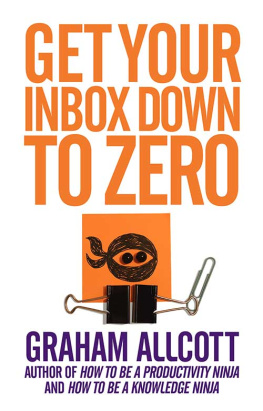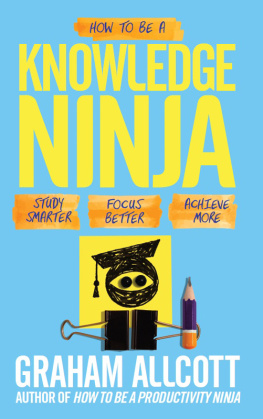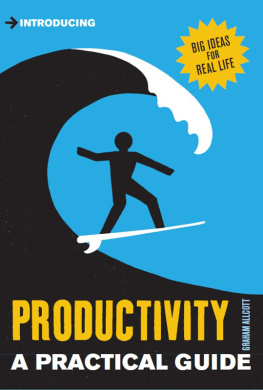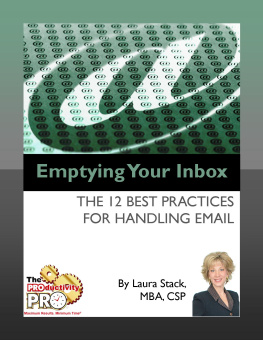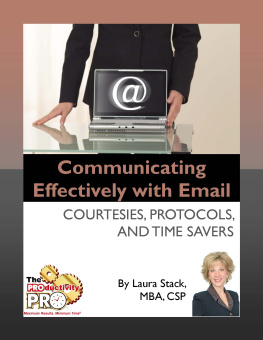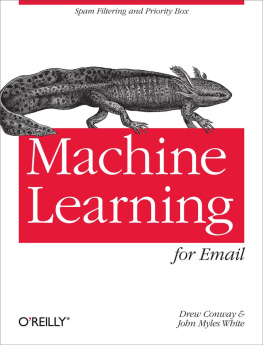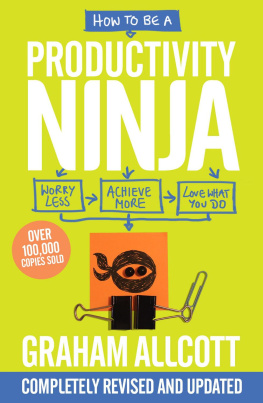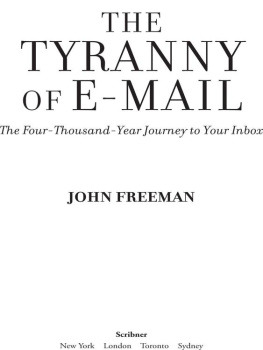This is an edited extract from
How to be a Productivity Ninja
by Graham Allcott
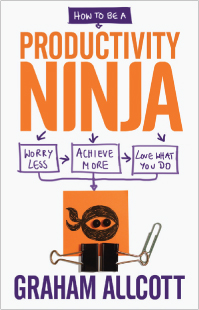
AVAILABLE NOW
WHEREVER BOOKS ARE SOLD!
Published by Icon Books Ltd
Omnibus Business Centre,
3941 North Road, London N7 9DP
email:
www.iconbooks.com
ISBN: 978-184831-996-7
Text and illustrations copyright 2015 Graham Allcott
The author and artist have asserted their moral rights.
No part of this book may be reproduced in any form, or by any means, without prior permission in writing from the publisher.
Managing our attention is the new key to Ninja-level productivity. The reason this is so crucial these days is simple: information overload.
Information overload not just from email, but from the internet, social networking sites, 24-hour news, work intranets and the sheer speed and volume of modern knowledge work is a much bigger challenge than it was even two years ago, let alone ten years ago, and this carries a major threat to our productivity. The more information we subject ourselves to, the more likely our attention moves away from the things we really need to focus on.
One of the most important soft skills you can have is figuring out how to deal with a high volume of email. And the only way to do that is to put some kind of a system in place thats simple and repeatable and is going to allow you to have an actual life outside of email.
Merlin Mann, 43folders.com and creator of Inbox Zero
Email in particular is a prime offender here. Research carried out by the Universities of Glasgow and Paisley has discovered that one third of email users get stressed by the heavy volume of emails they receive.
When I was a busy Chief Executive, and before I had any need to invest time in thinking about my own productivity (since, as a Chief Executive, I had plenty of people in the organization to be productive on my behalf!), my email management was completely out of control and it stressed me out. I had an inbox with 3,000 emails not yet dealt with and rising! and I would all too often need prompting to meet necessary commitments and deadlines. This approach would frequently mean I would miss opportunities to be proactive as well as obviously miss the deadlines concealed way down somewhere in the depths of my inbox.
Of course, even more stressful than knowing youve missed something vital that you needed to act on is not knowing that youre missing something vital that you need to act on! The fact that you dont even know what other opportunities or threats lie buried in that stack of emails, and how important that information and those opportunities could potentially be, is at the root of the stress most people feel about their email, and the obligation people feel to be constantly connected to it.
People become a slave to their email account as it piles up even further and it quickly becomes a constant drain on attention. When I was a Chief Executive I was never off my emails: I was constantly distracted by new emails coming in, and spent half my time scrolling up, scrolling down, scrolling up, scrolling down never actually fixing the mountainous problem in front of me, just regularly reminding myself that the mountain was still there to be climbed. Sound familiar at all?
THE PARADIGM SHIFT: CONNECTIVITY VS. PRODUCTIVITY
Today, my email practice is very different. I have a system in place that gets my inbox to zero several times a day, leaving me clear about what opportunities or threats are lurking, and miraculously, Im also able to track and follow up on particular emails at the right times so that things dont fall through the cracks and get lost in the back and forth of email. In this chapter Ill show you how this works and by following the exercises in this book, well get your email inbox to zero in the next couple of hours if youre up for it.
BEING CONNECTED REQUIRES VERY LITTLE THINKING. DEFINING THE MEANING OF INPUTS REQUIRES A LOT OF THINKING
Its time for you to rethink email. Lets start with the uncomfortable truth about the way that we work. As soon as more than one thing has our attention and we experience information overload, our instinctive reaction is that we want to feel busy in order to feel like were making progress. Because as a species were inherently lazy, we gravitate to the easiest way to achieve this illusion of progress.
We check for whats new, we scroll up and down, we fiddle around creating archive folders, we check for other new information (for example on our social media profiles or the news or our phone) and generally begin to develop an addiction to being connected. What were addicted to here is the illusion of productivity for a minimal payoff of thinking.
Getting your inbox to zero breaks out of this bad habit and changes the way you see email; you instead become addicted to being safe in the knowledge that all of the decision-making and thinking work has been done. The system itself forces Ninja-like decisiveness and discipline thats needed for you to make the difficult decisions about emails as soon as you read them, reducing procrastination time, increasing clarity about your work and vastly reducing the stress that email overload causes.
What gets measured gets managed.
Peter Drucker
The surprising thing and one that most people never discover is that once your email inbox is at zero, keeping it there is pretty easy. After all, theres no mountain left to climb, just todays molehill. In fact, one of the nicest things about using such a system is how easy it is to take couple of days out of the office, knowing that when you return you only have that many days processing to do, because youre starting from a zero position before you leave. Also, your ability to make decisions about each email will be so enhanced that you can go away for a weeks annual leave and come back and clear all your emails in a matter of an hour or so. And if you happen to experience a heavy volume of emails for a few days, and start to see your inbox building up again, you can easily measure this and estimate how long it will take to get you back to zero. Email changes from being a task that seems like an amorphous mass of work that will never be finished, into a quantifiable conveyor belt where every single email has a possible decision that can be made about it straight away. Sounds simple doesnt it? Well, the good news is that is really is!
THE MINDSET YOU NEED TO KEEP YOUR INBOX AT ZERO
There are three mindset changes required to implement this system that will wean you off your addiction to being connected to email and encourage you to develop an addiction to decisiveness and productivity instead.
YOUR INBOX IS JUST A PLACE WHERE EMAILS LAND
Your inbox is not your to-do list. I cannot emphasize this enough. Your inbox is not your to-do list. It is nothing more than a holding pen for where new inputs land. We often try to keep emails in our inbox because we dont want to lose them or we want to come back to them. But the really meaningful work goes on outside of the email inbox and using it as your primary to-do list reminder will mean either that things from elsewhere are missed or you end up having to email yourself. A lot. In addition, using your inbox as a to-do list mixes your to-do reminders with all the other noise that your inbox throws at you, so it can be difficult to know whats to do versus whats happening versus what can be ignored.

